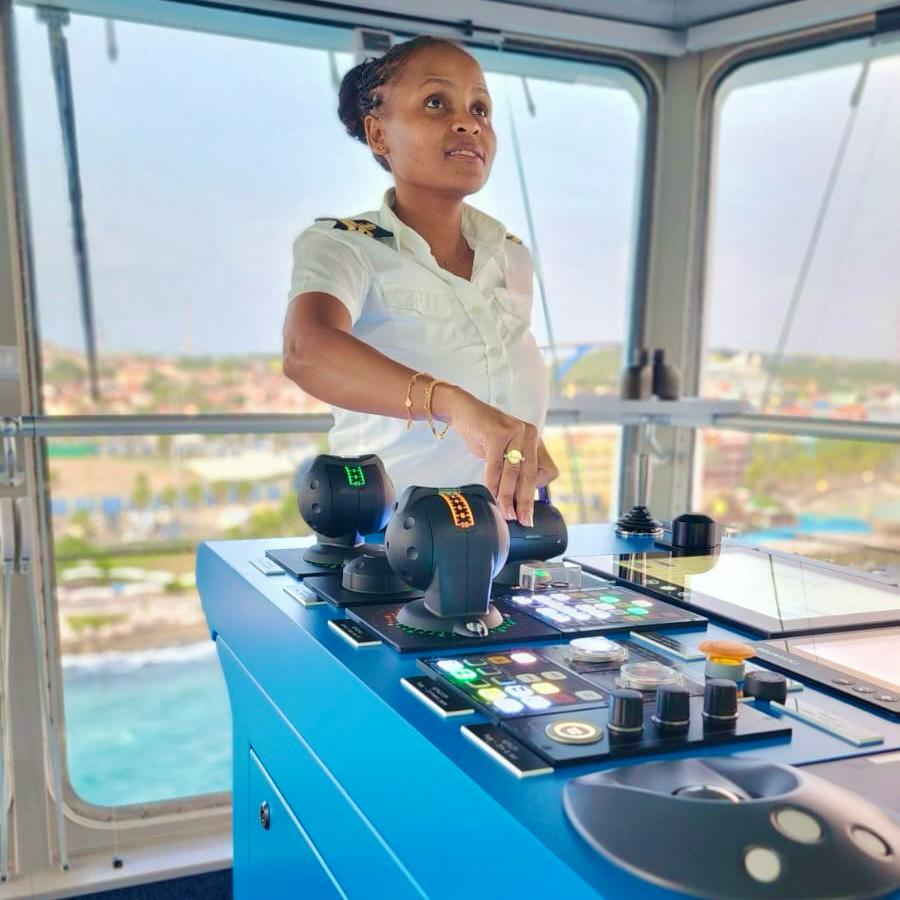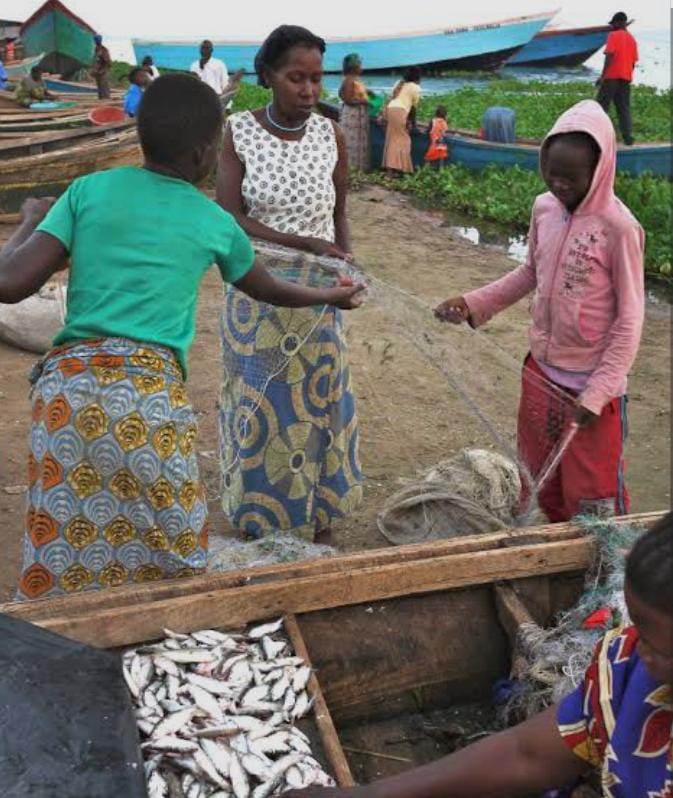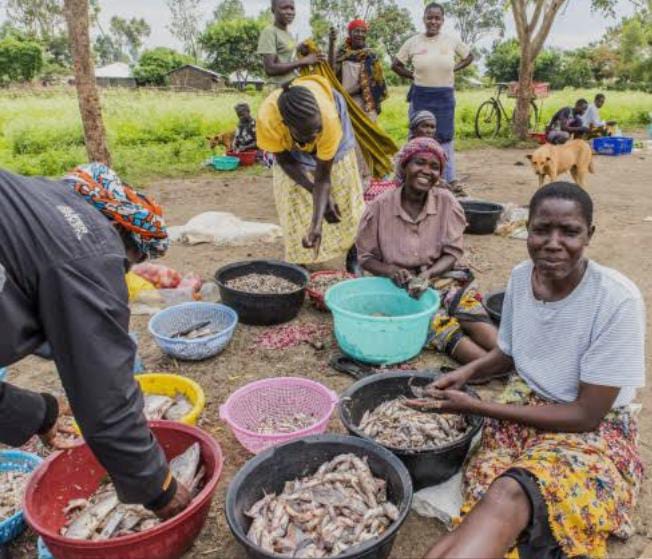
New era as women lead peace events in Mandera
Pawa amplifies women’s voices within the women, peace, and security framework.
Women's presence is gradually growing, particularly in leadership roles across various maritime professions.
In Summary

Audio By Vocalize

At Migingo island in Homabay County, Florence Akinyi sits near Lake Victoria armed with nets and boats as, shoal of dried Omena (small, pelagic, freshwater fish) surrounds her.
A widow, Akinyi, 43, owns four boats with extensive connections that have made her identify Omena and Mbuta (Nile Perch) market for both herself and fellow fisherfolk with ease.
Before becoming a boat owner, Akinyi worked as an Omena vendor for her friend, who later introduced her to the deep waters with the aim of making more proceeds through boat fishing, which allowed her more access to different fishing grounds and species of fish.
Akinyi decided to upgrade her job as an Omena vendor to boat ownership to improve on the amount she used to pocket and which could hardly sustain her family of seven.
“My job as an omena vendor was only able to help us have food on the table, even though it was also never sufficient, only pushing us through days with the understanding that no situation is permanent,” she says.
She adds that they lived by faith, believing that one day, “Nyasaye would make us lead a better life.”
Akinyi nostalgically narrates how her situation used to make her feel desperate and frustrated until one day she woke up and courageously decided to approach her employer for advice on how to surmount her troublesome situation.
After a long period of contemplation, the friend (read employer), finally decided to introduce her to one of the boat owners who used to make a good income in a day.
“After the death of your husband, you were left with a great burden to cater for your children. As your friend l will take hold of this matter and introduce you to one of my friends who is a renowned boat owner in this area and beyond and I believe she will be able to help you own at least one vessel. Being a boat owner will change your life.” Ms. Akinyi vividly recalls the words of her destiny helper with a wide smile all over her face.
She reminisces that day as the turning point of her life and mentally, she was ready to deal with the challenges of running boat business when the opportunity knocked well knowing that boat ownership was purely, a male-dominated field.
After a little orientation from the renowned businesswoman, Akinyi was able to catch up quickly and started saving up her proceeds with other women-led movements that helped vulnerable women who were living with HIV/AIDS and widowed.
Taking up the challenge was not a walk in the park. She at some point contemplated giving up on boat operations and go back to fish vending but the question at the back of her mind was “who would really employ and pay her well?”
However, with time, she struggled through the challenges and competition as a woman fisher and boat owner and she emerged successful and bought a second one.
Becoming a honcho in the fishing industry as a woman had challenges but Akinyi was no exception.
Globally, women in the maritime industry, including Akinyi, are making strides in breaking down barriers and are slowly gaining recognition in the historically male-centric venture.

Women's presence is gradually growing, particularly in leadership roles across the various maritime professions.
This is despite the challenges that abound globally such as low representation, where the women folk presently, make up merely a small percentage of the global maritime workforce estimated at only two percent according to the International Labour Organization, underrepresentation in leadership positions and traditional stereotypes where some individuals still hold traditional views that women are not suitable for maritime work hence creating barriers to their entry.
Despite the low numbers, the Maritime industry is ripe with opportunities for women, and Kenyans are quite aware of them, if the case of Elizabeth Marami, 28, is anything to go by. Marami made history recently by becoming the first Kenyan female marine pilot.
Born and raised in the coastal city of Mombasa, Marami had initially studied law at the University of Nairobi, but she later changed course, setting the way for fellow women in the country to venture into the many opportunities within our oceans and
As the country marked its inaugural International Day for Women in Maritime in Kisumu on 18th May this year, Principal Secretary of State Department for Shipping and Maritime Affairs Dr. Nancy Karigithu, emphasised on more efforts to break barriers impeding women advancement in the sector.

The International Day for Women in Maritime is marked on 18th May every year as established by resolution A 32/Res.1170 by the International Maritime Organisation (IMO.
It is intended to promote the recruitment, retention and sustained employment of women in the maritime sector, raise the profile of women in maritime, strengthen IMO's commitment to the United Nations Sustainable Development Goal 5 (Gender Equality) and support work to address the current gender imbalance in maritime.
This year’s theme was "An Ocean of Opportunities for Women", which celebrates the emerging prospects and transformative leadership roles women can assume in reshaping a traditionally male-dominated industry.
The PS notes that the Government has made substantial strides in promoting gender equality and women participation in most sectors in the country and challenges them to venture more into the Maritime and Blue Economy.
She voices the Government’s growing recognition of the need to harness the full potential of the workforce by including more women adding that her State Department has through Bandari Maritime Academy, successfully trained 7,714 seafarers between 2022 and 2025 on different maritime related courses from different counties in accordance with the Standards of Training, Certification and Watchkeeping (STCW) requirements.
Further, the PS notes, the Kenya Maritime Authority has within the same period successfully enabled recruitment of 5,041 seafarers to various job opportunities with 6,170 coxswains having been issued with practicing certificates in the Financial Year 24/25.
“Additionally, in an effort to make our seafarers more competitive and recognized globally, the State Department in collaboration with other stakeholders has developed a Seafarer Identity Document (SID).
The SID development process is complete and the State Department is in engagement with the International Labour Organization (ILO) to ensure that the samples provided meet the minimum requirement as is required under the Convention No. 185 of the Seafarers Identity Document and are expected to be produced immediately ILO completes the audit and grants approval,” declares the PS.
Echoing Dr. Karigithu’s sentiments, the Government Spokesperson Dr. Isaac Mwaura says the government has unveiled a two-year plan aimed at revitalizing the Fisheries and Blue Economy sectors as part of a broader effort to transform rural livelihoods and economically empower citizens.
“The plan recognizes the Blue Economy as sustainable use of ocean resources for economic growth, improved livelihoods, and jobs, while preserving the health of marine and coastal ecosystems.
It encompasses activities that promote economic growth and ecological balance, focusing on the exploitation, preservation, and regeneration of the marine environment aiming to balance economic development with environmental sustainability, ensuring that ocean resources are utilized responsibly.” The Spokesperson explains.
Oprah Nyaboke works as an PSIP Intern at the Office of Government Spokesperson.

Pawa amplifies women’s voices within the women, peace, and security framework.